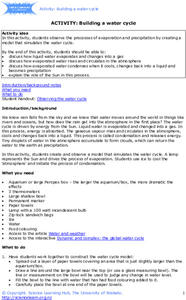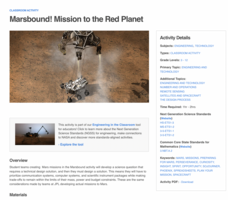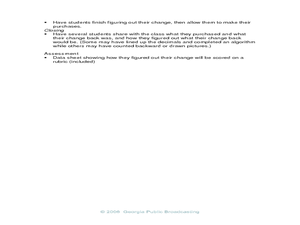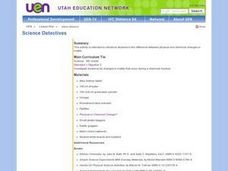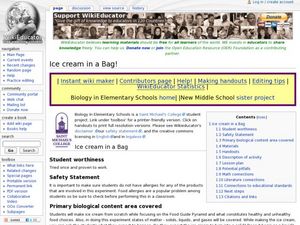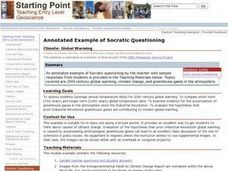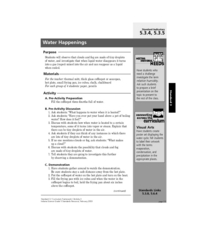University of Waikato
Building a Water Cycle
Bring the water cycle to life with in the classroom. Young scientists use household materials to create and monitor a water cycle model. They record changes in the water levels and make observations of where and how fast precipitation...
Las Cumbres Observatory
Star In a Box (Paper-Based)
Do stars age gracefully? Young astronomers use colored paper and data on luminosity and temperature to model the changes of a star during its lifetime. They then compare models of stars of different mass and radii.
American Chemical Society
Chlorofluorocarbons and Ozone Depletion
The best of intentions can have negative results. Learners explore the history of the use of chlorofluorocarbons and their effects on the ozone layer. They discover how widely the compound was used because of its unique chemical...
NASA
Marsbound! Mission to the Red Planet
Changing one aspect of a mission impacts all the others. Learners consider a list of criteria as they develop their own science questions related to Mars and design a solution while considering all the important systems: computer,...
Bonneville
Solar Powered Water Pumping
Here's the perfect lesson for those who think the world needs faster pumps. Building on the previous activity, scholars work to make the pumps function faster in transferring water between containers. They try adding an additional solar...
Curated OER
Introducing Linear Terminology
Ninth graders graph linear equations and inequalities in two variables and then, they write equations of lines and find and use the slope and y-intercept
of lines. They use linear equations to model real data and define to define the...
Curated OER
Icecream in a Baggie
Students apply their comprehension of colligative properties to real-world situations. They review the concepts of physical and chemical changes. Students are reminded that science is used extensively in food-production. They are...
Curated OER
Seasons of Trees
Students examine how trees change over time. In this forestry activity, students read the book The Seasons of Arnold's Apple Tree and choose three trees to observe over a period of time. Students record observations and seasonal changes...
Curated OER
SPENDING: Maintaining the Skill of Money
Fourth graders explore the concept of maintaining money. In this personal finance lesson, 4th graders earn "money" for cleaning their classroom desks. Students spend the "money" in the classroom and practice making change.
Curated OER
Science Detectives
Fifth graders examine the differences between chemical and physical changes. As a class, they are read a scenerio and determine whether it was deliberate act or not. In groups, they observe the changes of an alka-seltzer tablet and...
Curated OER
Activity #9 Tye Green Blob
Students comprehend that a chemcial change produce substances with a different composition and physical and chemcial properties. They state the differences between physical and chemical changes. Pupils observe changes that occur during...
Curated OER
Physical vs. Chemical
In this physical vs. chemical change activity, students answer 10 questions about identifying chemical and physical changes. They identify exothermic and endothermic reactions and the parts of a chemical equation. Students answer 1...
Curated OER
Is It Getting Hot In Here?
Students describe several factors and ways climate change could effect communities. In this climate change lesson students research climate change and complete a worksheet.
Curated OER
Activity #15 The Snowy Christmas Tree
Middle schoolers weigh out the proper amount of silver nitrate and prepare the silver nitrate solution. They observe what occurs when pure copper is added to silver nitrate solution. Pupils determine whether the change in the appearance...
Curated OER
Snowflake Crystals
Fourth graders explore physical changes and the true life story of Wilson Bentley. They observe the changes that take place with snowflakes. Students discuss what happens when snow flakes melt. They create their own snowflakes using...
Curated OER
Ice Cream in a Bag
Learners observe phase change of matter by making ice cream in bags. In this states of matter lesson plan, students work in pairs to churn their own ice cream in plastic bags. They make predictions about how long it will take for the...
Curated OER
Piggin' out with Money
Third graders manage money. In this money math activity, 3rd graders read Pigs Will be Pigs. Students then use manipulatives to practice adding monetary amounts and making change. Students also practice working with money on selected...
Curated OER
Annotated Example of Socratic Questioning: Climate: Global Warming
Students compare and discuss short-term and longer-term global temperature data. They evaluate data from three sets of graphs and then participate in a structured whole class Socratic discussion on the possible causes of climate change.
Curated OER
Season's Greetings
Students explore Earth's seasons using an interactive website. In this earth science lesson, students watch video segments and explain Earth's seasonal milestones. They discuss the factors that causes seasonal changes.
Curated OER
Glacier Presentations
Young scholars research news articles relating to global climate change. In this earth science lesson, students create a news broadcast using the information they gathered. They present this in class and each student gives their peer...
Curated OER
Activity #18 Decompostion of Baking Soda
Pupils observe what occurs as baking soda is heated. They explain why a chemical rather than a physical change occurred during the procedure. Pupils identify the tpe of reaction (decomposition). Students conduct a glowing splint test...
Curated OER
The Big Burp: Where's the Proof.
Young scholars explore the Cambrian explosion and Paleocene extinction events. In this climate change lesson, students read articles to link evidence they find to extinction and climate change. Links to the articles are included in the...
Curated OER
Water Happenings
Fifth graders observe how water changes phase through a teacher-led demo. In this earth science lesson, 5th graders relate the demo to the water cycle. They draw and label each stage of the cycle.
Cornell University
Forensic Science: Case of the Missing Diamond Maker
Someone stole a diamond-making machine. Who done it? Scholars use forensic science at six different stations to determine the culprit. They analyze fingerprints, use their senses, and complete chemistry experiments to determine the...


